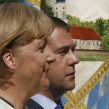
German Business Interests Speak Out During Russo-German Summit
Publication: Eurasia Daily Monitor Volume: 6 Issue: 142
By:

Writing in yesterday’s (July 23) issue of the German business daily Handelsblatt, former chancellor Gerhard Schroeder offers an updated view of the Russo-German "strategic partnership." Schroeder hails Chancellor Angela Merkel’s meeting last week in Munich with Russian President Dmitry Medvedev, in the format of a Russo-German inter-governmental meeting with high-level business participation. Schroeder had institutionalized this format as a semi-annual, informal summit when he was chancellor and developed the strategic partnership with Russia, which Merkel has carried forward. The Munich meeting discussed some ambitious joint economic projects at the governmental and corporate levels, with input from the former chancellor as current chairman of the Gazprom-led Nord Stream project.
Schroeder’s essay invokes U.S. President Barack Obama’s initiatives toward Russia to justify by analogy Germany’s own special relationship with Moscow (Schroeder’s close ally, incumbent Minister of Foreign Affairs Frank-Walter Steinmeier, also uses this argument). Claiming that the United States and Russia are now embarking on a bilateral "partnership of equals," Schroeder finds justification for Germany to pursue a similar course of its own. He does not, however, claim equal status for Germany with Russia; rather, he calls for a "trust-based" German relationship with Russia (a variation on Steinmeier’s "we should take the Russian president at his word"), implying unilateral German trust in a Russia deemed to hold stronger cards.
This strategic partnership’s ramifications have reached by now from business into the geopolitics of Europe’s East. As Schroeder makes clear, this means ruling out Ukraine’s and Georgia’s NATO candidacies (as Merkel did already in the spring of 2008). It may even allow a degree of erosion to the status quo in Central Europe, as Schroeder implies in urging the Obama administration to "not allow itself to be influenced" by the recent appeal from former leaders of Central European countries (EDM, July 22). For its part, he concludes, "Germany must hold firmly to its strategic partnership [with Russia] and build it up" (Handelsblatt, July 23).
While Schroeder operates from a key post in the Russo-German natural gas business, the East Commission of German Business represents industrial manufacturers’ interests in market access to Russia and German state support to that end. Dating back to pre-1989 times, the East Commission significantly influenced then West Germany’s bilateral rapprochement with the Soviet Union. At present the East Commission promotes Germany’s strategic partnership with Russia on the levels of business and foreign policy, seeking to integrate the two dimensions.
Commenting on the Russo-German summit just held, East Commission chief Klaus Mangold urges the German government to push within the European Union for the "speediest signing of a new E.U.-Russia Partnership and Cooperation Agreement" (PCA) and for Russia’s inclusion into the European Union’s Eastern Partnership Initiative for the E.U.’s neighborhood (Frankfurter Allgemeine Zeitung, July 15). Through such advocacy, the East Commission seeks German government support not just for business interests but also for concessions to Russia at the level of E.U. policies. Russia seeks a "speedy" PCA, but most E.U. countries are cautious and differ significantly with Russia over the PCA’s content. The E.U.’s Eastern Partnership, which comes into effect this year, is tailored specifically for six of the E.U.’s neighbor countries, and not Russia. One influential view in the German government, however, holds that Russia should be included in the Eastern Partnership as proof that E.U. policy is not anti-Russian.
On the whole, the notion of strategic partnership remains poorly defined at the political level for now. On the German side it is mainly based on business interests and supported in varying degrees, or at least accepted, across German party lines, with little reflection on the wider strategic implications. In practice, however, this relationship has reached the point of overriding Germany’s ties with some of Germany’s Euro-Atlantic allies – admittedly in an often-divided alliance.
America’s much-diminished gravitational pull in Germany and the lack of a common policy of the E.U. are facilitating Germany’s drift into this self-styled strategic partnership with Russia, sometimes at the expense of Europe’s East and overall Western interests; as well as placing Germany’s own energy security at risk in the process. As Michael Stuermer (one of Germany’s most distinguished historians, former top government adviser, and on the whole supportive of this special relationship) wryly noted on the occasion of the Munich summit, "only Finland has a similar special relationship with Russia" (Die Welt, July 17).




